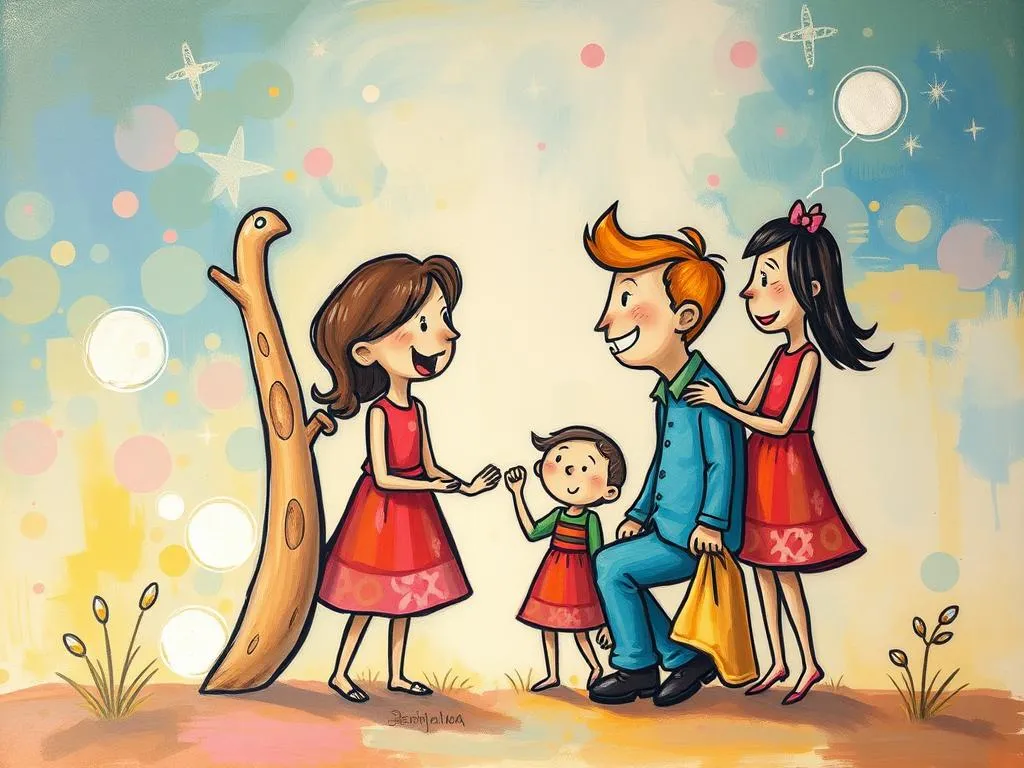
Introduction
Dreams have fascinated humanity for centuries, serving as a bridge between our conscious and subconscious minds. Among the myriad of dream themes, family-related dreams often evoke strong emotions and resonate deeply with individuals. These dreams can reveal our innermost thoughts, concerns, and desires regarding familial relationships—often acting as a mirror reflecting the complexities of our interactions with loved ones. The intrigue surrounding family dreams lies not only in their emotional depth but also in their potential to unveil hidden meanings about our personal lives and psychological states.
Family dreams can vary significantly in tone and content, ranging from harmonious gatherings to conflicts and misunderstandings. Each scenario provides a unique lens through which we can examine our waking life and the relationships that shape us. By exploring the symbolism inherent in these dreams, we can uncover valuable insights that may guide us in navigating our real-life familial dynamics.
Symbolism and Meaning
At the core of family dreams are symbols that can illuminate the underlying emotions and themes present in our relationships. Understanding these symbols is crucial for deciphering the messages our subconscious is trying to convey.
Family Members: When you dream about specific family members, each person’s role in your life can influence the dream’s meaning. For instance, dreaming of a parent may symbolize authority, guidance, or unresolved issues from childhood. A sibling might represent competition, camaraderie, or shared experiences. The emotional tone and context of the dream can shift these interpretations significantly.
Home: The setting of a family dream often takes place in a home environment, which symbolizes security, comfort, and familiarity. A well-kept home may indicate a sense of stability in your family life, while a chaotic or dilapidated home could suggest underlying tensions, unresolved conflicts, or feelings of instability.
Conversations and Interactions: Dialogue within dreams can serve as a powerful tool for understanding your relationships. If you find yourself in a supportive conversation with a family member, it may reflect your desire for open communication and connection. Conversely, arguments or disagreements can highlight unresolved issues or feelings of discontent.
Childhood: Dreams that transport you back to childhood settings or experiences often signify a return to innocence, nostalgia, or unresolved issues from your past. These dreams may be urging you to address lingering emotions or conflicts that originated during your formative years.
Symbols of Conflict: Items like broken objects, locked doors, or dark spaces can represent barriers in your familial relationships. These symbols may indicate feelings of frustration, isolation, or the need to confront difficult emotions.
By analyzing these symbols within the context of your dream, you can gain a deeper understanding of your relationships and emotional landscape. It’s essential to consider not only the symbols themselves but also the feelings they evoke—this emotional response often holds the key to interpretation.
Key Scenarios and Variations
Family dreams can manifest in numerous scenarios, each carrying distinct implications. The variation in these dreams often alters their overall message, providing a broader spectrum of insights.
One common scenario is a family reunion. Such dreams may reflect a longing for connection and unity, suggesting a need to strengthen ties with family members. The joyous atmosphere can symbolize a desire for harmony and resolution, particularly if you have experienced recent conflicts or separations within the family.
In contrast, a family conflict dream often highlights unresolved tensions. If you dream of a heated argument with a family member, it may indicate feelings of frustration or a desire to express grievances that you have been suppressing. This type of dream can also suggest that you need to confront these issues in your waking life to foster healing and understanding.
Another interesting variation involves absent family members. Dreaming of a family member who has passed away can evoke feelings of grief, nostalgia, or unresolved feelings. These dreams may serve as a reminder to process your emotions or to reflect on the lessons learned from that individual. Alternatively, if you dream of a family member who is physically distant, it might signify a longing for connection or a need to address feelings of abandonment.
Parenting scenarios, whether you are a parent or not, can also provide rich material for analysis. Dreaming of caring for children or struggling with parenting responsibilities may reflect your own anxieties about family obligations, personal growth, or the legacy you wish to leave for future generations.
Lastly, family gatherings can take on a more surreal or chaotic tone, suggesting feelings of overwhelm or a lack of control in your family dynamics. These dreams may indicate that you are grappling with the complexities of family expectations and the pressure to conform to certain roles.
Exploring these varied scenarios can deepen your understanding of your emotional state and facilitate personal growth. Reflecting on the specific circumstances and feelings associated with these dreams can provide clarity and direction in your waking life.
Real-Life Connections and Takeaways
Connecting your family dreams to real-life situations can yield profound insights, encouraging personal reflection and growth. Start by asking yourself how the themes and symbols in your dreams relate to your current familial relationships or emotional state. This process can be both enlightening and therapeutic.
Consider maintaining a dream journal where you can record your family dreams along with your feelings and thoughts upon waking. This practice can help you identify patterns and recurring themes, making it easier to connect your dreams with your waking experiences. Over time, you may notice that your dreams serve as a guide, pointing out areas in your life that require attention or healing.
Additionally, think about the messages your dreams may be conveying regarding your relationships. Are there unresolved conflicts or unexpressed feelings that need to be addressed? Use your dreams as a catalyst for open dialogue with family members. Expressing your concerns or desires for connection can lead to healthier relationships and foster understanding.
Furthermore, consider the emotional tone of your dreams. Do you feel joy, sadness, anxiety, or frustration? Identifying these emotions can help you discern what aspects of your family life may need nurturing or resolution. If a particular family member frequently appears in your dreams, reflect on your relationship with them. Are there specific issues that require attention?
Finally, remember that dreams are a personal experience. While general interpretations can provide a framework, your unique emotions and life circumstances ultimately shape their meanings. Take the time to engage in self-reflection, allowing your dreams to guide you toward deeper understanding and growth.
In conclusion, family dreams are a rich tapestry of symbolism and emotion, offering insights into our relationships and personal experiences. By exploring the meanings behind common symbols, variations in scenarios, and real-life connections, we can unlock the hidden messages that our dreams convey. Embrace the opportunity to reflect on your dreams, and allow them to illuminate your path toward healthier familial dynamics and personal growth.







